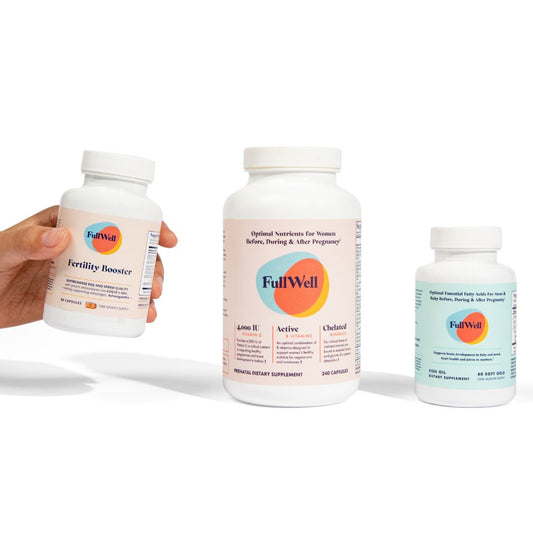Nourishing Egg and Sperm Quality with Ayla Barmmer MS, RD, LDN
Read more

When it comes to your health, aiming to get most of your vitamins, minerals, and macros from whole, unprocessed foods will always be the gold standard.
In reality, some things are out of our control. Though we are food-first advocates, we understand that supplementing is needed more often than not to help nutritionally support fertility.
Supplements can be a helpful addition for those of us who:

If you haven’t read my post on hormone disrupting chemicals, bookmark it for a quick read once you’re done here.
A colorful, well-balanced, ultra-varied diet can only do so much. Unfortunately, even with the most careful, educated planning and consideration, the food on your plate may have gaps beyond your control.
Current farming practices in the United States deplete the nutrient density of our soil. As a result, our food is grown ten times faster than the soil can replenish itself. Mainstream farming methods that encourage repeat planting and overuse of the soil completely strip it of its nutritional value, reducing the nutrient density of our food supply. In an attempt to course-correct, conventional farming techniques try to compensate by adding pesticides and fertilizers (aka hormone disruptors) to revitalize the soil. Unfortunately, these chemicals can end up sticking around even after our food has been thoroughly washed. Not only do these residual pesticides alter the nutrient content of our food, but they are also unsafe for you and the healthy development of baby.
Organic, sustainable farming methods matter. However, since they are no longer the norm, organic, high-quality foods are both less accessible and more expensive. An entirely organic diet can be challenging to achieve, especially on a budget.
So much of our food - even “health food” - is processed into oblivion these days to increase shelf life and enhance flavor. Continuing to be diligent when reading nutrition labels is a must, with fewer, more straightforward ingredients being the preferred choice. However, even trusted manufacturers sometimes get a pass from the FDA due to misleading practices in denoting ingredients, so you can assume many of your favorite foods contain chemicals and compounds you’re not banking on when you buy them.
Since food can be either contaminated with hormone disruptors like pesticides or is no longer as nutritionally dense due to common-practice processing, we must fill in the gaps. This is especially important while trying to conceive, pregnant, or breastfeeding.
Filling in these gaps isn’t rocket science. The most viable solution to rectifying nutrient deficiencies that cannot be solved through diet alone is to incorporate high quality, third-party tested supplements.
We look at (and live by) four major safety factors before recommending our clients, patients, and community invest their time and money in a supplement: quality, sourcing, manufacturing, and testing. If a supplement provides consumers with an understanding of the purity of the ingredients, production practices, and verified, independent test results, you can often feel confident in putting your trust behind a supplement.
Synthetic nutrients are isolated nutrients made in a lab or industrial setting. Technically, on a molecular level, they are considered to be almost chemically identical to those found in food. On the other hand, whole food or natural supplements are made from concentrated and dehydrated foods.
While there is no contest between eating whole foods and synthetic supplements when it comes to getting our nutrients, following the same logic when comparing whole food supplements to their synthetic counterparts isn’t always a sure thing. Form and bioavailability play a part in the efficiency equation from nutrient to nutrient. Sometimes whole food supplements can be the most effective option, but there are many instances where it can be the least (and this is coming from a group of staunch, real-food RDs!).
Whether you choose synthetic or whole-food supplements (or a combination of the two) depends on what you hope to achieve with the supplement you select. For example, you may choose a supplement with a blend of synthetic and whole food ingredients because the whole foods enhance nutrient absorption or remove the need for artificial binders. Our Women’s Prenatal, for instance, contains iodine from kelp, and our Nourished Nerves Calming tincture solely contains herbs (also considered whole foods) to help support sleep and nervous system balance.
On the other hand, it can make more sense to choose a synthetic form of an ingredient if it's a more efficient way to achieve the required dose. Getting the evidence-based suggested amount in each capsule can sometimes be challenging with whole foods supplements. Vitamin C is an excellent example of this. Whole-food vitamin C sources are problematic due to the massive amount of whole-food material you must include to achieve evidence-based doses of vitamin C. For our flagship women’s prenatal, the serving size would increase by two capsules or more, easily. There would also be heavy metal concerns with using concentrated whole food sources of vitamin C. Our formula uses a synthetic form of vitamin C, because we believe that if a synthetic supplement is chemically identical to a natural supplement and provides a higher level of bioavailability, there’s no reason to avoid it.
The short (and perhaps unexpected) answer:
The term “whole food supplement” or “natural supplement” is often used in marketing to make consumers think they are purchasing a higher quality supplement when this isn’t always true. Whether you choose whole food supplements over synthetic comes down to your “why.” For those that are trying to conceive, pregnant, or breastfeeding, accuracy when it comes to dosing (meaning, the amount of nutrients in each capsule) and bioavailability (or how well your body can utilize the nutrients you are taking) are critical considerations for the health of mom and baby. When your nutrient needs are higher, you want to ensure you can trust the supplement you are taking!
You're already way ahead if you’re considering getting down to the nitty-gritty of your nutrient deficiencies through lab work. Unfortunately, it's not standard practice for primary care physicians to run detailed lab work for women trying to conceive without a glaring issue, so you will likely have to request these labs from your physician.
For quick reference, here are the labs I recommend for anyone trying to conceive. Knowing this data helps you avoid potential issues, making conceiving easier and pregnancy healthier.
These values help get a baseline understanding of your iron status and if any form of anemia may be present. They also help you to get the correct diagnosis by excluding any infections or inflammation that may be present. You do not want to go into pregnancy anemic! Similarly, you don't want to take an iron supplement right out of the gate if you don't need it, as too much iron can cause its own set of issues (one of them being constipation, which we are NOT looking to experience ever, but especially while pregnant!). This is why we’ve chosen to skip adding iron to our prenatal. Iron needs and tolerance vary significantly by individual.
You don’t want to simply request that your practitioner run labs for "vitamin D," whether you’re trying to conceive or already pregnant. Many providers mistakenly order vitamin D-1, 25, which is not the correct way to assess vitamin D status accurately. That’s because this form of vitamin D hasn’t made it to your kidneys and is not readily bioavailable, so your body can’t use it all just yet. That number might even look relatively high, especially if you’ve already started proactively supplementing with vitamin D. Still, vitamin D-1, 25 does not reflect your actual vitamin D status, so be sure the correct test is ordered. I’ve had clients come to me from other providers who have been advised to stop taking vitamin D out of fear of toxicity. To me, this is alarming. Your practitioner ordering the wrong test can scare you into halting vitamin D supplementation when you desperately need it, so you must be clear that you want to be checked for vitamin D, 25-Hydroxy (vitamin D 25-OH).
One of the top reasons why people struggle with infertility and pregnancy loss is due to undiagnosed or under treated thyroid conditions. Therefore, understanding your thyroid health before pregnancy is vital. If anything comes back out of the ordinary, booking an appointment with a healthcare practitioner who can help you assess your thyroid needs might be worth it.